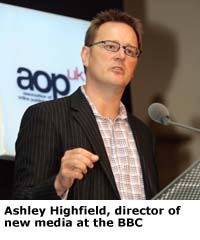 The 2005 AOP conference closed with some healthy futurology; a massive shift to on-demand media consumption and user-generated content.
The 2005 AOP conference closed with some healthy futurology; a massive shift to on-demand media consumption and user-generated content.Fresh from not just his honeymoon but also his 40th birthday, BBC's director of new media and technology Ashley Highfield explained what he described as the 'profound shift' towards on-demand and user-generated content.
User generated content (UGC) accounts for one to two per cent of overall consumption on the BBC site, but he predicts a quick and profound shift in UGC that will see that proportion grow to 10 or 20 per cent.
He also predicts that users will combine their own content with their traditional media consumption; BBC 1 and BBC 2 alongside 'My wedding TV' or 'My home video'.
The past nine months have seen an explosion in consumption of web video, he said. At peak times, the same number of people are using the website as are watching the Six O'Clock News on BBC 1. Some radio shows have as many online listeners as radio listeners.
"The trick to responding to this change is to get the timing right, and to judge the impact on existing technology," said Mr Highfield.
"It's all about coexistence - video didn't kill the radio star, after all."
"Tech predictions can go up as well as down"
"Content is not necessarily king," he told the conference.
In the future, media will rely on three pillars: content, quality and functionality.
"The BBC is based on the first two pillars and we have believed that if we had an excellent range of content we would win through - but we were wrong.
"Google is now the world's most-valued media company, and that is based on the third pillar - as are Amazon, Yahoo! and eBay. All based on functionality, and if we don't want to be disinter-mediated we must provide that."
Ashley's vital statistics
• 16m licence fee-payers use the BBC website every month.
• The BBC radio player had 48 million requests this year.
• The total licence fee income is £3 billion per year.
• When the BBC simulcast Pope John Paul II's funeral, 300,000 people watched it online. One third of those stayed for more than 15 minutes.
• By 2008, standard broadband connections will be 8Mb - DVD quality.
• 15 million people in the UK now use broadband.
• 78 per cent of 14-21 year-olds use broadband at home.
Cheeky iMP
The BBC's new interactive media player (iMP) project is just the tip of the iceberg, he said, because the real change in on-demand content will come when the BBC's creative archive is fully launched and offers 6,000 hours of material. These projects present enormous challenges to the BBC's technologists.
He said the technologists and the technology must be taken as seriously as the content. In the past 18 months, he said there had been a noticeable shift of creatives from TV into new media.
"Technologists are being seen as the new creatives and should be regarded as highly as the best journalists and producers."
Mr Highfield was asked how the BBC is working to be less competitive towards commercial media, in response to the Graf report.
He used the BBC's work on digital rights as an example, saying that the project had provided a valuable industry model for digital rights management; content published on the iMP will expire seven days after broadcast.
The future's bright. The future's aggregated.
"The mindset needs to shift from that of a mass producer and publisher to a much more potent mix of high-quality niche content, and also as a mass aggregator of third-party content," said Mr Highfield.
"That transition is not easy for many publishers. For those who get the importance of search and navigation alongside content, the future will be a bit brighter."
• Also blogging: Mike Butcher for Moco News and Greg Tallent for Bear Storm.
Free daily newsletter
If you like our news and feature articles, you can sign up to receive our free daily (Mon-Fri) email newsletter (mobile friendly).
Related articles
- Audiences, AI and audio apps: five talking points from Perugia
- Protecting independent journalism, with Lexie Kirkconnell-Kawana of IMPRESS
- Why Australia's bid to make big tech pay for news failed: views from an indie publisher
- Five key takeaways from the UK select committee on the future of news
- How Reuters, Newsquest and BBC experiment with generative AI









